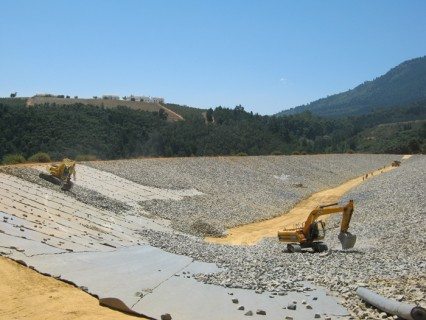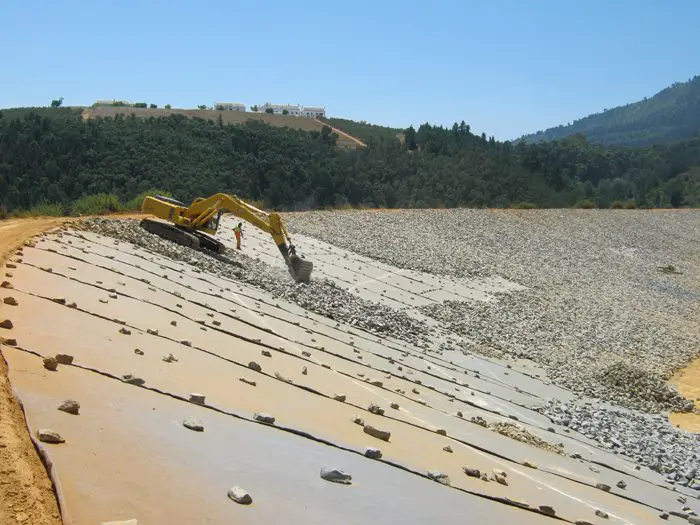Located in the picturesque Knorhoek Valley between Stellenbosch and Paarl is the 158ha Quoin Rock Wine Farm. When the farm was sold in 2012, the new owners decided to have two of the leaking farm dams sealed. Specialist geotechnical engineers Melis & Du Plessis were appointed for this task and specified Kaytech’s top quality Geosynthetic Clay Liner (GCL), EnviroFix X800 to solve the problem.
A proudly South African manufactured product, EnviroFix is designed for lining water and waste containment sites. It is produced by needling a uniform layer of sodium bentonite, a naturally occurring clay mineral, between two durable outer layers of geotextile. When sodium bentonite, with a structure comprising charged platelets, comes into contact with moisture, it swells considerably. If this occurs under confinement, it forms a lining with a low permeability equivalent to that of approximately one metre of compacted clay.
With these clay-constructed farm dams situated on the slopes of the imposing Simonsberg Mountain, their steep embankments posed a problem if the conventional layer-works approach was adopted. Since the consultants were already familiar with the time-saving, easy installation of EnviroFix, it was a simple choice to make.
The EnviroFix was laid onto a well compacted, smooth surface and covered with Kaytech’s recommended minimum cover thickness of 300mm on the floor of the dams, and a 150mm clay cover layer on the slopes of the dams. The additional confinement required on the slopes was made up with a layer of 200-250mm size riprap, placed on top of the GCL/clay lined embankments for protection against erosion and wave action. Since this angular riprap had sharp edges, a specific protection geotextile was placed beneath it.
Consultants had no hesitation in specifying Kaytech’s bidim A8, which is stronger and more robust than bidim A7 but easier to install and more economical than the heavier bidim A10.
Manufactured by Kaytech from 100% recycled polyester (PET), bidim is a nonwoven, continuous filament, needlepunched geotextile. With its simple installation, environmentally friendly bidim is extremely cost-effective and, due to its inert characteristics, will extend the life and maintain the integrity of a liner system long after the required design lifespan has ended. Kaytech began incorporating recycled PET bottles into its nonwoven production in the mid 80s.
Because Kaytech simply melts down the granulated bottles, crystallizes the polymer and spins it directly into filaments, the good properties built into the raw materials are retained and the resultant filaments have the strength and durability demanded by civil engineers. Over the past decade, Kaytech has converted more than 18 million kilograms of polyester (rPET) into bidim and other civils products.

Power Construction, part of the national company Power Group, was awarded the contract to install EnviroFix X800 and by the end of the project, Dams A and B had been lined with 36 000m2 of the clay liner. In total, Power Construction installed 34 000m2 of bidim A8 (750g/m2) inside the dams, allowing sufficient retention of soil underneath the riprap. Over 472 222 recycled PET cooldrink bottles were used in the manufacture of the 34 000m2 of bidim supplied to this project. Another great recycling example from Kaytech.

